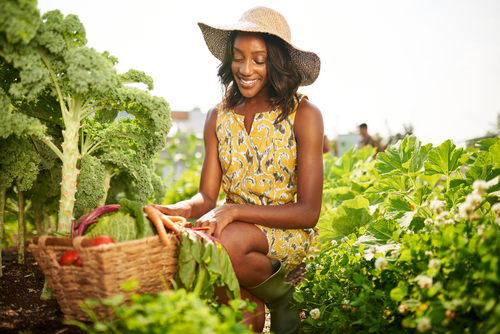Backyard gardening is healthy for both body and mind; it’s fun, but it’s not the easiest thing in the world. Even seasoned gardeners learn something new every day, and those who’ve only picked up on it are certainly in for a challenge or two.
Today we’ll walk you through the basics of backyard gardening and provide a few helpful tips so that you can avoid some of the most common gardening mistakes. Without any further ado, let’s dive straight into it.
Revisit your watering technique
The very core of gardening lies in the water. Plants depend on it for sustenance, but it can also ‘drown’ them should you use too much of it. If presented to the plants in insufficient quantity, they will become frail and are most likely to get plagued by garden pests.
Inquire about how much water each plant in your garden needs, but you should also take into account the quality of dirt surrounding each plant. Frail, brittle plants are best watered with cups for extra precision, while robust plants can be watered with a regular hose. Avoid the most potent power levels unless you are trying to scrape insects from the plants’ leaves.
The importance of a proper watering technique is in the fact that you may end your gardening journey pretty quickly should you neglect it. Once refined and polished, a good watering technique will even help your plants become more resistant to various pest types.
Pest control
One of the daily chores of all gardeners is pest inspection and pest elimination when needed. Gardeners who think pest inspection once a week is often enough can end up facing infestations of garden mice, aphids, and beetles.
Aphids are widely considered to be the biggest annoyance for backyard gardeners. Their tiny bodies are camouflaged when they latch onto the leaves, and the fact that they tend to hide on their undersides doesn’t help either. Handpick them if there are only a few. Otherwise, use organic sprays (water mixed with essential oil, for example).
Larger infestations of aphids can be culled by introducing ladybugs and birds, given that they are the natural predators of most insect-type pests.
Wasps are pretty dangerous, as they feed on plants and can be aggressive to humans. However, some gardeners don’t mind a few wasps buzzing in their backyard, as they also tend to eat caterpillars, aphids, and beetles. Out of all insect ‘companions,’ wasps are ranked pretty low.
You can quickly get rid of them by scattering bits of peppermint oil near your plants. Strong scents repulse them, so using citronella candles is more than likely to keep them away. Should you face an infestation of dozens of wasps, your best bet is to hire professional wasp exterminators.
Rodents, such as rats and mice, are prone to playing mind games with gardeners, as they are both stealthy and incredibly patient. Keep your garden tidy and clean of debris to dissuade them from nesting. Pets, such as cats and dogs, will actively hunt them and will likely scare them off with their scent alone. Again, exterminators are the best option against larger infestations.
Planning your garden with companion plants
While companion predators are usually insects or birds that prey on garden pests, companion plants are plants that reinforce adjacent plants, granting them various benefits, such as healthier growth, improved taste, or protection against all kinds of pests.
Regular plants can be considered ‘companion plants’ in some instances. In such a scenario, we’re talking about the symbiosis between two plant types that is beneficial for both.
For example, beans grow the healthiest when planted near broccoli, cabbage, corn, or carrots. Cabbage grows best when grown next to other plants from its family (cauliflower, collard, kale, Brussels sprouts, turnip).
Garlic and onion should ideally be planted next to beets, carrots, lettuce, and cabbage plants, while garden peas can be grown next to pretty much anything. On the list of more demanding vegetables are peppers, whose companion plants are basically basil and onions exclusively, and zucchini, whose companions are corn, radishes, and beans.
Monitoring and controlling humidity in your garden
Humidity is one of the factors that most beginner gardeners rarely register, let alone know how to influence. However, backyard gardeners who live in extreme humidity areas know how important it is to mist the plants, put them in cups with pebbles, and relocate them on such occasions.
There are multiple ways to balance the humidity short-term, but the best way is to use an actual humidifier if humidity is low; otherwise, use a dehumidifier device. By a long shot, you may want to consider creating a desirable atmosphere for your plants where humidity-altering efforts can persist. For instance, creating a terrarium will solve most of your problems.
Heavy-duty outdoor dehumidifying devices are generally the best solution to decreasing humidity in larger spaces, although these can be quite expensive and bulky. Enclosing your plants will certainly allow you to have more control over humidity levels without needing to utilize significant, costly devices.
Using compost to increase the quality of soil
Experienced gardeners can carefully select a good spot to start their garden. However, as a backyard gardener, you are essentially limited in this regard. Unless you are lucky and have a patch of good-quality dirt in your backyard, you will face many challenges growing even the least demanding plants.
Fortunately, using compost piles can mitigate most of your problems in this field. Composting, when done right, can drastically increase the quality of soil, which further boosts the healthiness of plants connected to it.
There are numerous ways to create your own, but if you are inexperienced and want a quicker solution, you’d be better off buying a few bags of pre-made compost. Most gardening shops sell it in large bags, and most cashiers in such venues will help you decide which (and how much) compost you should buy.
Building your own pile may be more time-consuming and more expensive, but it allows you to add specific ingredients that can better cater to your garden’s soil needs.
We hope that this brief guide was helpful to you and that you have learned something new today on the essential things to pay attention to when doing backyard gardening. Make sure you are staying safe in these times we are all going through, and have a good one, guys!





Leave A Comment